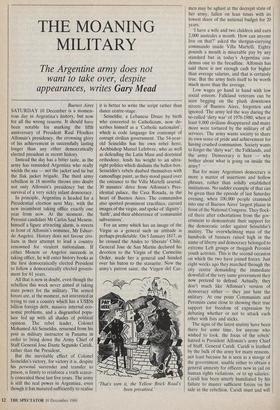THE MOANING MILITARY
The Argentine army does not want to take over, despite
appearances, writes Gary Mead Buenos Aires SATURDAY 10 December is a momen- tous day in Argentina's history, but now for all the wrong reasons. It should have been notable for marking the fifth anniversary of President Raul Ffoulkes Alfonsin's presidency, the crowning glory of his achievement in successfully lasting longer than any other democratically elected president in recent history.
Instead the day has a bitter taste, as the army has reminded Argentina who really wields the axe -- not the jacket and tie but the flak jacket brigade. The third army rebellion in 18 months throws into doubt not only Alfonsin's presidency but the survival of a very sickly infant democracy.
In principle, Argentina is headed for a Presidential election next May, with the new incumbent taking office exactly one year from now. At the moment, the Peronist candidate Mr Carlos Saul Menem, himself a figure attracting alarm, is streets in front of Alfonsin's nominee, Mr Eduar- do Angeloz. History does not favour civi- lians in their attempt to lead a country renowned for virulent nationalism. If either Menem or Angeloz succeeds in taking office, he will enter history books as the first democratically elected President to follow a democratically elected govern- ment for 61 years.
All that is now in doubt, even though the rebellion this week never aimed at taking state power for the military. The armed forces are, at the moment, not interested in trying to run a country which has a US$56 billion foreign debt, massive internal eco- nomic problems, and a disgruntled popu- lace fed up with all shades of political opinion. The rebel leader, Colonel Mohamed Ali Seineldin, returned from his post as military instructor in Panama in order to bring down the Army Chief of Staff General Jose Dante Segundo Caridi, rather than the President.
But the inevitable effect of Colonel Seineldin's victory, for victory it is, despite his personal surrender and transfer to prison, is firmly to reinforce a truth scarce- ly concealed these last five years. The army is still the real power in Argentina, even though it has matured sufficiently to realise
it is better to write the script rather than dance centre-stage.
Seineldin, a Lebanese Druze by birth who converted to Catholicism, now de- scribes himself as a 'Catholic nationalist', which is code language for contempt of corrupt civilian government. The 54-year- old Seineldin has his own rebel hero, Archbishop Marcel Lefebvre, who as well as defending the Latin Mass and doctrinal orthodoxy, lends his weight to an ultra- right politics which disdains the ballot-box. Seineldin's rebels daubed themselves with camouflage paint, as they stood guard over the entrance to the Villa Mutelli arsenal, 30 minutes' drive from Alfonsin's Pres- idential palace, the Casa Rosada, in the heart of Buenos Aires. The commandos also sported prominent crucifixes, carried images of the virgin, and spoke of 'dignity', 'faith', and their abhorrence of 'communist subversives'.
For an army which has an image of the Virgin as a general such an attitude is perhaps predictable. On 5 January 1817, as he crossed the Andes to 'liberate' Chile, General Jose de San Martin declared his devotion to the Virgin of the Carmelite Order, made her a general and handed over his baton to the statuette. , Now the army's patron saint, the Virgen del Car- 'That's torn it, the Yellow Brick Road's been privatised.' men may be aghast at the decrepit state of her army, fallen on lean times with its lowest share of the national budget for 20 years.
'I have a wife and two children and earn 2,000 australes a month. How can anyone live on that?' asked the shotgun-carrying commando inside Villa Martelli. Eighty pounds a month is miserable pay by any standard but in today's Argentina con- demns one to the breadline. Alfonsin has said there is not enough cash for higher than average salaries, and that is certainly true. But the army feels itself to be worth much more than the average.
Low wages go hand in hand with low social esteem. Falkland veterans can be seen begging on the plush downtown streets of Buenos Aires, forgotten and ignored. The army led the way during the so-called 'dirty war' of 1976-1980, when at least 9,000 civilians disappeared and many more were tortured by the military of all services. The army wants society to share its own sense of pride and achievement for having crushed communism. Society wants to forget the 'dirty war', the Falklands, and the army. Democracy is here — why bother about what is going on inside the army? • But for many Argentines democracy is more a matter of assertions and hollow phrases, rather than solidly established institutions. No sadder example of that can be given than the episode of last Saturday evening, when 100,000 people crammed into one of Buenos Aires' largest plazas in front of the National Congress. They flock- ed there after exhortations from the gov- ernment to demonstrate their support for the democratic order against Seineldin's mutiny. The overwhelming mass of the hundreds of banners raised high in the name of liberty and democracy belonged to extreme Left groups or thuggish Peronist youth activists. This is the second occasion on which the two have joined forces. Just eight weeks ago they marched through the city centre demanding the immediate downfall of the very same government they now pretend to defend. Actually, they don't much like Alfonsin's version of democracy either — they just hate the military. At one point Communists and Peronists came close to showing their true support for freedom of expression by debating whether or not to attack each other with fists and sticks.
The signs of the latest mutiny have been there for some time, for anyone who wished to look, the focus of the rebels' hatred is President Alfonsin's army Chief of Staff, General Caridi. Caridi is loathed by the bulk of the army for many reasons, not least because he is seen as a stooge of the government, unable either to obtain a general amnesty for officers now in jail on human rights violations, or to up salaries. Caridi has been utterly humiliated by his failure to muster sufficient forces on his side in the rebellion. Caridi must and will go: the only question now is when.
Once he departs, little is left of President Alfonsin's claim to be in charge of the country. Throughout the crisis he threw his weight into Caridi's camp, ordering him to repress the insurrections by force. Up to late Monday night Alfonsin pledged his 'total confidence' in Caridi. Caridi was further snubbed, however, when many other regiments around the country re- fused to follow the order to assist in smashing the rebels.
The rebels hope that once they have got rid of Caridi they will get a replacement more in line with their thinking, probably General Isidro Caceres, who has acted as intermediary throughout. It will be his task, or that of whoever else takes over, to push Alfonsin even further down the road towards a general amnesty for imprisoned officers, and a further squeeze on the state's already dehydrated revenues. The real power in Argentina pulls the strings without having to incur the wrath of the nation by actually setting up a government. Alfonsin retains nominal control, even as titular head of the armed forces. It is even possible that his successor will be a civilian, democratically chosen next May. With luck, that successor might actually set up camp in the Casa Rosada on 10 December 1989. But until there is a genuine purge of the likes of Seineldin and the thousands more who revere him and his ideals, Argentina cannot be said to be a democra- tic state. And who is in any condition to abolish a whole army?



























































 Previous page
Previous page